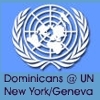

| Israel
Palestine
Dominicans have worked in the Middle East for over 250 years. Some of the significant groups in Jerusalem are the Dominican men who conduct a university program in biblical studies at Ecole Biblique. Dominican women are working in schools, hospitals, and parish work in Israel-Palestine. In spite of hardship, our sisters continue to conduct schools,
and work in hospitals and with refugees. On a recent visit with
our sisters, they described the deteriorating economic conditions
for the Palestinian people. The present political situation, which
includes the system of checkpoints and restriction on travel, has
contributed to the instability and fear of the people. It is extremely
difficult to obtain travel visas. In addition, Dominican women and men are present in Jordan, Lebanon, Syria, Egypt, and Iraq. While we continue interest in and advocacy for the people of Israel and Palestine, we recognize the inter-relationships of the wider region and look toward working, with many others, for peace in the Middle East. Working Group on Israel Palestine Mission Statement: The Non-governmental Organization Working Group on Israel Palestine advocates for a just peace by acting within the United Nations community to bridge the realities of life on the ground in Israel and the Occupied Palestinian Territories with international debate and policy. Member Statement: I. The working group is a coalition of organizations that have
met since 1999 to share information and advocate for a just peace
in Israel Palestine. The working group is a unique body whose individual
members are accredited to the United Nations. Each member must also
have an organizational link to Israel Palestine. This dual commitment
enables the working group to bridge the two communities. III. The working group's advocacy in the United Nations community
IV. The working group supports the centrality of the United Nations and Security Council resolutions 242 and 338, which call for a resolution to the conflict. V. The working group supports nonviolent resolution of the conflict. The working group sees violence as an impediment to peace. VI. The working group maintains that peace will only become a reality when all parties have confidence that a power imbalance has been corrected, their inalienable human rights are protected, and the demands of justice are respected.
|
   Resources American Friends Service Committee Gush Shalom Churches for MidEast Peace Domincan Call to Justice: Israel Palestine |
Dominican Leadership Conference
Building relationships and collaborating in the mission of preaching the Gospel
29000 West Eleven Mile Road
Farmington Hills MI 48336
248-536-3234 Contact: Executive Director